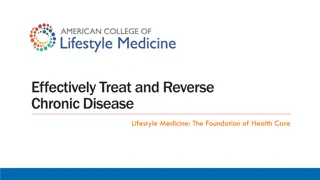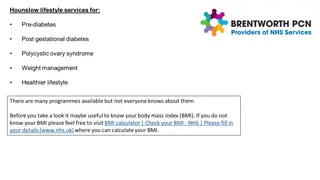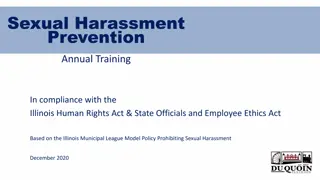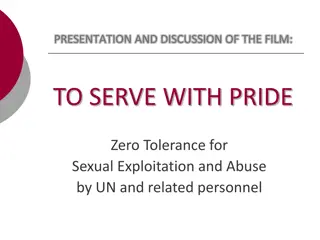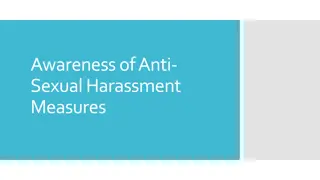Understanding Sexual Health for a Healthy Lifestyle
Explore the innate nature of sex, embrace puberty positively, and understand the importance of sexual health to lead a healthy lifestyle. Learn about sexually transmitted infections, HIV/AIDS, and methods to reduce risks. Engage in group activities and quizzes to enhance your knowledge on sexual health.
Download Presentation

Please find below an Image/Link to download the presentation.
The content on the website is provided AS IS for your information and personal use only. It may not be sold, licensed, or shared on other websites without obtaining consent from the author. Download presentation by click this link. If you encounter any issues during the download, it is possible that the publisher has removed the file from their server.
E N D
Presentation Transcript
Learning Objectives 1. To understand sex is innate, part of nature, we should accept oneself positively and naturally 2. To learn what sexual health is about, comprehend how to deal with various physical and psychological changes, embrace puberty with a calm manner, and to develop a healthy lifestyle 3. To know the ways of transmission and other related knowledge of sexually transmitted infections and HIV/AIDS
Group Activity The Battle on Sexual Health Knowledge How knowledgeable are you on sexual health?
Quiz:How knowledgeable are you on sexual health? 1 5 9 13 2 6 10 14 3 7 11 15 4 8 12 16
Quiz: How knowledgeable are you on sexual health? 1. Sexually Transmitted Infections mean: A. Illnesses primarily transmitted by having sexual intercourse B. Illnesses that affect the functions of sex organs C. Illnesses with defects in sex organs D. All of the above Back Back
Quiz: How knowledgeable are you on sexual health? 2. How many liters of a HIV carrier s saliva should someone swallow to have a chance of infection? A. 1liter B. 2 liters C. 3 liters D. 4 liters Back Back
Quiz: How knowledgeable are you on sexual health? 3. What is the official name for the STI nicknamed Cauliflower ? A. Chancroid B. Lymphogranuloma Venereum C. Genital warts D. Genital Herpes Back Back
Quiz: How knowledgeable are you on sexual health? 4. Which sexually transmitted infection below cannot be cured? A. Syphilis B. Gonorrhea C. Herpes II D. Genital warts Back Back
Quiz: How knowledgeable are you on sexual health? 5. All of the methods below are capable of reducing the chance of sexually transmitted infections, but which one has the best result? A. Learn the partner s sexual history B. Use a condom in every sexual intercourse C. Have one sex partner only D. Reduce the number of sexual intercourse Back Back
Quiz: How knowledgeable are you on sexual health? 6. HIV infection cannot be detected for a period of time. How long is it? A. One month B. Three months C. Six months D. One year Back Back
Quiz: How knowledgeable are you on sexual health? 7. Herpes I is not categorized as a sexually transmitted infection, but what is one of its symptoms of infection? A. Burning urination B. Mouth ulcer C. Pubic lice found in pubic hair D. Swollen lymph Back Back
Quiz: How knowledgeable are you on sexual health? 8. Symptoms of Syphilis infection will: A. Be detected easily B. Continue to show C. Disappear naturally D. Make someone happy Back Back
Quiz: How knowledgeable are you on sexual health? 9. Which one of the following is NOT the main method of transmission for HIV/AIDS? A. Sexual intercourse or oral sex B. Sharing injection tools for drug taking C. Infected mother-to-child transmission D. Hereditary causes Back Back
Quiz: How knowledgeable are you on sexual health? 10. Which one of the following virus causes genital warts? A. HPV B. HMV C. HIV D. HNV Back Back
Quiz: How knowledgeable are you on sexual health? 11. Generally, how many days is a woman s menstrual period? A. One to two days B. Two to three days C. Three to five days D. Five to seven days Back Back
Quiz: How knowledgeable are you on sexual health? 12. What is the color of semen normally? A. Creamy B. Pale yellow C. Creamy or pale yellow D. Transparent Back Back
Quiz: How knowledgeable are you on sexual health? 13. not relate to pimples? Which of the following skin problems does A. Blackheads B. Acne C. Cyst D. Rash Back Back
Quiz: How knowledgeable are you on sexual health? 14. If your friend has body odor, you should: A. Avoid and keep a distance B. Understand and remind him/her C. Tolerate and accept D. Support and tell others Back Back
Quiz: How knowledgeable are you on sexual health? 15. If you have a crush on someone, what should you do first? A. Learn to get along with that person B. Wait for that person to tell you his/her feelings C. Confirm both as a couple as soon as possible D. Support whatever decision that person has made Back Back
Quiz: How knowledgeable are you on sexual health? 16. If you have sexual fantasy, you should: A. Think you have mental problems B. Find ways to deal with your sexual needs as soon as possible C. Share your fantasy with others D. Pay attention if you have become addicted or not Back Back
Conclusions To be equipped with basic knowledge on sexual health (including STIs and HIV/AIDS), in order to reduce unnecessary misunderstandings and the risk of infection. To learn to protect themselves and their future partner, such as: understanding one s own attitudes to love and intimacy boundaries recognising that promiscuity not only involves ethical issues but will also increase the chance of contracting sexually transmitted infections, which not only affects their own psychological and physical health, but also increases the risk of public health of the entire community.





